(完整word版)7Bunit2最新广州、深圳沪教版牛津英语七年级下册教案
牛津初中英语7BUnit2教案
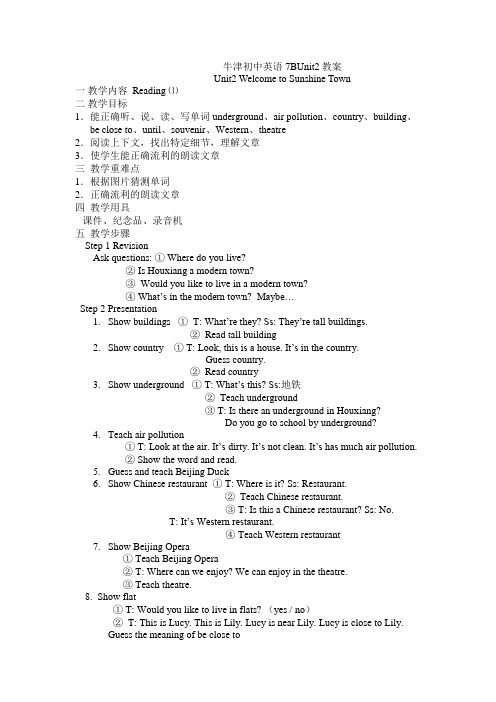
牛津初中英语7BUnit2教案Unit2 Welcome to Sunshine Town一教学内容 Reading ⑴二教学目标1.能正确听、说、读、写单词underground、air pollution、country、building、be close to、until、souvenir、Western、theatre2.阅读上下文,找出特定细节,理解文章3.使学生能正确流利的朗读文章三教学重难点1.根据图片猜测单词2.正确流利的朗读文章四教学用具课件、纪念品、录音机五教学步骤Step 1 RevisionAsk questions: ① Where do you live?② Is Houxiang a modern town?③Would you like to live in a modern town?④What’s in the modern town? Maybe…Step 2 Presentation1.Show buildings ①T: Wha t’re they? Ss: They’re tall buildings.②Read tall building2.Show country ①T: Look, this is a house. It’s in the country.Guess country.②Read country3.Show underground ①T: What’s this? Ss:地铁②Teach underground③ T: Is there an underground in Houxiang?Do you go to school by underground?4.Teach air pollution①T: Look at the air. It’s dirty. It’s not clean. It’s has much air pollution.② Show the word and read.5.Guess and teach Beijing Duck6.Show Chinese restaurant ① T: Where is it? Ss: Restaurant.②Teach Chinese restaurant.③ T: Is this a Chinese restaurant? Ss: No.T: It’s Western restaurant.④ Teach Western restaurant7.Show Beijing Opera① Teach Beijing Opera② T: Where can we enjoy? We can enjoy in the theatre.③ Teach theatre.8. Show flat① T: Would you like to live in flats? (yes / no)②T: This is Lucy. This is Lily. Lucy is near Lily. Lucy is close to Lily.Guess the meaning of be close to③ Show be close to and give the winner a souvenir④ Example: Xu Hui is close to Wu Feng.9. Show supermarket① T: When does it open / close? Ss: It opens at 8:00am. It closes at 10:00pm.② T: It means the shop is open until 10:00 in the evening.Guess the meaning of until③ Give a souvenir to the winner and teach until10. Show two glasses of orange juice. Look at these two glasses of orange juice. The orange juice in glass1 is less then in glass2.Guess the meaning of less then.Give a souvenir to the winner and teach less then.Example: I have one yuan. You have five yuan. I have less money then you have.11. Teach the new word souvenir.Step 3 Reading1.There is a great new town called Sunshine Town. There are lots of things to doin Sunshine Town. Now, let’s learn about the life in this great new town.2.Read paragraph1①Answer questions: ① Where is Sunshine Town?②How long does it take from the center of Beijing?③What’s the name of the country park?④What can you see in the country park?②Read part1 after tape and read together.③Read by themselves then ask two to read out.3.Read paragraph2①Do the exercise…and check the answer.②Read after the tape and read together.③ Read by themselves then ask two to read out.4.Read paragraph3 and do the T/F questions.Read after the tape and read together.5. Read part4-5 and find questions in four.Ask and answer …Read two parts after tape, and read together.Step 4 Exercise1.Go through the text and fill in the blanks.2.Ask someone to read and check.Step 5 Read the text by groups, then choose some groups to read.Step 6 HomeworkRead the text after class;Fish the exercise book.。
牛津版七年级英语下册7B Unit2 教案
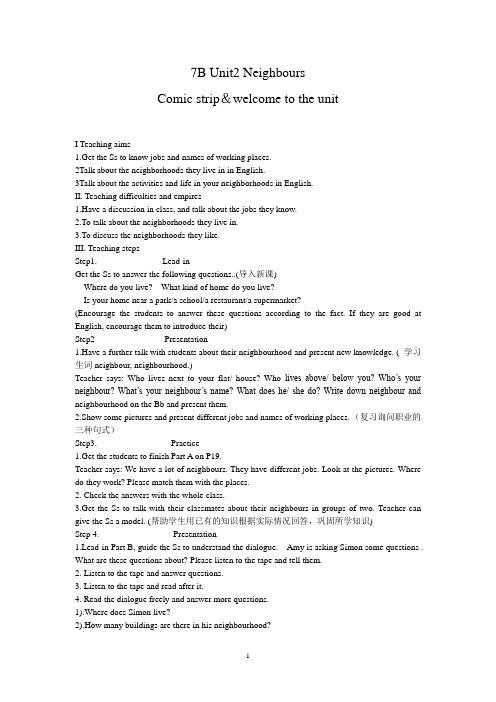
7B Unit2 NeighboursComic strip&welcome to the unitI Teaching aims1.Get the Ss to know jobs and names of working places.2Talk about the neighborhoods they live in in English.3Talk about the activities and life in your neighborhoods in English.II. Teaching difficulties and empires1.Have a discussion in class, and talk about the jobs they know.2.To talk about the neighborhoods they live in.3.To discuss the neighborhoods they like.III. Teaching stepsStep1. Lead-inGet the Ss to answer the following questions..(导入新课)Where do you live? What kind of home do you live?Is your home near a park/a school/a restaurant/a supermarket?(Encourage the students to answer these questions according to the fact. If they are good at English, encourage them to introduce their)Step2 Presentation1.Have a further talk with students about their neighbourhood and present new knowledge. ( 学习生词neighbour, neighbourhood.)Teacher says: Who lives next to your flat/ house? Who lives above/ below you? Who’s your neighbour? What’s your neighbour’s name? What does he/ she do? Write down neighbour and neighbourhood on the Bb and present them.2.Show some pictures and present different jobs and names of working places. (复习询问职业的三种句式)Step3. Practice1.Get the students to finish Part A on P19.Teacher says: We have a lot of neighbours. They have different jobs. Look at the pictures. Where do they work? Please match them with the places.2. Check the answers with the whole class.3.Get the Ss to talk with their classmates about their neighbours in groups of two. Teacher can give the Ss a model. (帮助学生用已有的知识根据实际情况回答,巩固所学知识)Step 4. Presentation1.Lead-in Part B, guide the Ss to understand the dialogue. Amy is asking Simon some questions . What are these questions about? Please listen to the tape and tell them.2. Listen to the tape and answer questions.3. Listen to the tape and read after it.4. Read the dialogue freely and answer more questions.1).Where does Simon live?2).How many buildings are there in his neighbourhood?3).What do they have around their neighbourhood?4) What does Simon think of his neighbourhood?5.Divide the Ss into two groups and read the dialogue.6 Work in pairs and make up your own conversation about your neighbourhood.Step 5 Presentation1.Have a free talk with Ss and present new words. Such as, visitor , like , .2.Present Comic strip , listen to the tape and answer a question .Where is Hobo going?(听录音回答问题,检查听力效果)3.Read after the tape and answer more questions.Where does Eddie do when he visits his neighbour?4.Present languages.Step 6 Practice1.Read the dialogue in pairs.2.Act out the dialogue.3.Encourage Ss to talk about Comic strip. EG.. Do yo u think Eddie’s new neighbours welcomehim? Why or why not? If you have a neighbour like Eddie, do you welcome him?(检查学生学习及应用所学语言能力和表达能力)4.Finish some Exs.Step7 .Sum-upGo through the new words and the language points learn during this lesson.1. What’re the meanings of these words?waiter, doctor, teacher, nurse,student, cook2. Pay attention to these sentence patterns.I’m afraid …How many … are there?It’s good to …Step8 Homework1.Review the contents of this lesson.2.Write a conversation between you and one of your friends. You can talk about your neighbourhood.Unit 2 NeighboursReading (Ⅰ)Teaching aims:● To learn about Simon’s neighbours●To infer meaning from keywords, context and existing knowledge●To understand a series of events and simultaneous actions.●To paratise the students’ abilities of reading and comprehension.Teaching Procedures:Step 1 DiscussionAsk the students to talk about their neighbours by answering the following questions.1. Where do you live?2. How many buildings are there in your neighbourhood?3. What do you have around your neighbourhood?4. Do you like living there?5. Do you often help your neighbours?6. What are your neighbours like?(本环节旨在导入Reading 的话题,同时又训练了学生的口语。
牛津英语七年级下册 unit2教案

牛津英语七年级下册 unit2教案牛津英语7Bunit2语法\'n\'and\'nne\'n1通常只用作形容词,后面必须跟名词,意思相当于nta或者ntan。
2不能和另一个限定词(冠词、物主代词或者指示词)连用。
否则应该用nnef。
Ian\'tgetthere----there\'snbus2Thereerenlettersfrthisrning3Nteaherserethere,eithernne通常用作代词,后面无需加名词,意思相当于n+名词。
2nnef…的意思是ntanf…。
当其用于句首时,如果nne 指代的是可数名词,那么后面的谓语动词既可以用单数,也可以用复数。
Thereisnilinthisbttle,andthereisnneinthatbttle,eith er2Iliennefthefd3Nneffriendslivenearhere实战演练:根据句意,选用n或nne填空。
______studentsareinthelassrandthereis_____teaherini t,either2----Arethereanbsnthedes?----N,thereare________3SrrIan\'tstp----Ihave______tie4I\'veread_______fthesebs______ftheaeintie6Shehad______ideahatIeant7Thesigneans\'_______singhere\'8Ilie_______fthefdIttastessurThedefiniteartile\'the\'定冠词the主要和名词连用,表示某个或某些特定的人或者东西。
其主要用法如下表:主要用法例词或例句表示世界上独一无二的东西。
thesun,theearth,then,thes特指某(些)人或事物。
(完整word版)牛津上海七年级7BUnit2复习教案

教学过程:1. 基础知识梳理2. 重要句型及语法3. 课堂练习4. 家庭作业Part 1基础知识梳理:1.重点词汇和短语1. stupid adj. 近义词foolish, silly例: a stupid mistakea silly behavior2. robber n.强盗rob ( robbed , robbed ) v. rob a bankrob sb. of sth. 抢了某人某物robbery n. 抢劫案拓展:steal (stole, stole n )偷steal sth. from sb.小偷thief 盗窃案theft3. hate 用法同likehate to do sthhate doing sth注意两种用法之间的区别4. in space 在太空中,在于宙中space = room 空间例: Would you please leave me some space/room ? in the space 表示在… 空间里例: We can put no thi ng in the space betwee n these two desks.这两个写字台之间的空间已经不允许我们放任何东西了。
注意:in space 禾口in the space 的区另U类似的还有:in hospital生病住院in the hospital 在医院at school 上学at the school 在学校at table 在吃饭at the table 在桌旁5. duration n. 持续时间We hope the war will be of short duratio n. 我们希望战争是短期的。
during : 在…期间6. price 价格high price low price注意:price 拾配的形容词用high, low, 不用expensive, cheap7. happy a. happily ad happ in ess n (un….)8. Choose v.选择3) Shall we …?4) Let ' s ….=5) You' d better …【语法点:】Neither用法小结1. neither用作形容词,表示“两者)都不”置于单数名词之前。
7Bunit87Bunit2沪教牛津版七年级下册教案.doc
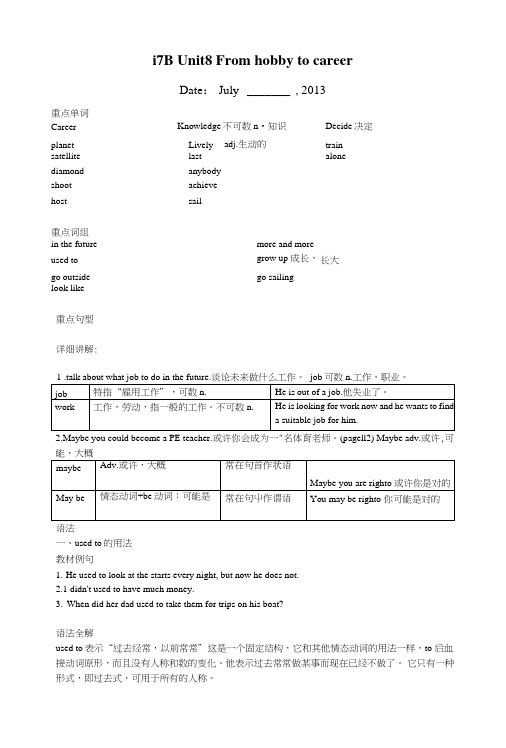
i7B Unit8 From hobby to careerDate: July _______ , 2013重点单词Career Knowledge不可数n•知识Decide决定planet Lively adj.生动的trainsatellite last alonediamond anybodyshoot achievehost sail重点词组in the future more and moreused to grow up 成长,长大go outside go sailinglook like重点句型详细讲解:2.Maybe you could become a PE teacher.或许你会成为一"名体育老师。
(pagell2) Maybe adv.或许,可语法一、used to的用法教材例句1.He used to look at the starts every night, but now he does not.2.1 didn't used to have much money.3.When did her dad used to take them for trips on his boat?语法全解used to表示“过去经常,以前常常”这是一个固定结构,它和其他情态动词的用法一样,to 后血接动词原形,而且没有人称和数的变化。
他表示过去常常做某事而现在已经不做了。
它只有一种形式,即过去式,可用于所有的人称。
Li Ming used to do his homework on Sundays, but now he often does his homework on Saturdays.I used to get up at half past six in the morning; now I usually get up at severu【拓展】used to的否定形式可以为used not to,也可以为didn't used to<.疑问句式也有两种: Did e to...?/ Used ...to...?二、when引导的时间状语从句教材例句1・ When she visits her friends, she always brings a presents.2.When I was eight, I got a book about starts.3.When the girl got older, she sailed the boat herself.语法全解1.When是一个连词,意为:"当.... 的吋候”,后面跟一个句子。
沪教版深圳英语7BUnit-2Travelling-around-the-world导学案
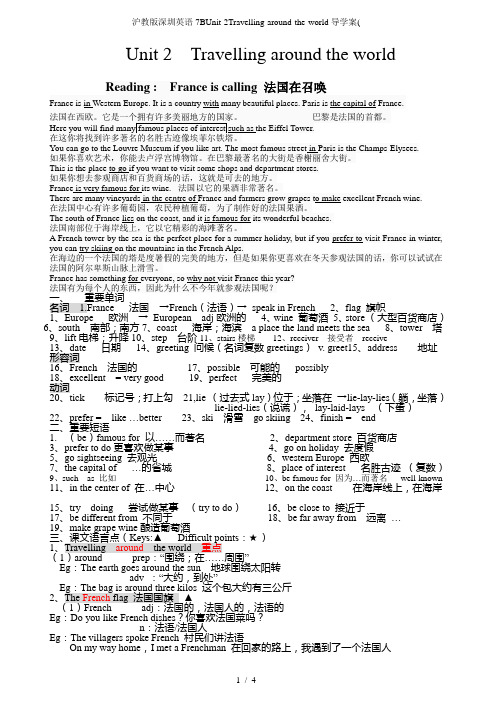
Unit 2 Travelling around the world一、重要单词名词 1.France 法国→French(法语)→speak in French 2、flag 旗帜1、Europe 欧洲→European adj欧洲的4、wine 葡萄酒5、store (大型百货商店)6、south 南部;南方7、coast 海岸;海滨 a place the land meets the sea 8、tower 塔9、lift电梯;升降10、step 台阶11、stairs楼梯12、receiver 接受者receive13、date 日期14、greeting 问候(名词复数greetings)v. greet15、address 地址形容词16、French 法国的17、possible 可能的possibly18、excellent = very good 19、perfect 完美的动词20、tick 标记号;打上勾21,lie (过去式lay)位于;坐落在→lie-lay-lies(躺,坐落)lie-lied-lies(说谎),lay-laid-lays (下蛋)22、prefer = like …better 23、ski 滑雪go skiing 24、finish = end二、重要短语1.(be)famous for 以……而著名2、department store 百货商店3、prefer to do更喜欢做某事4、go on holiday 去度假5、go sightseeing 去观光6、western Europe 西欧7、the capital of …的省城8、place of interest 名胜古迹(复数)9、such as 比如10、be famous for 因为…而著名well-known 11、in the center of 在…中心12、on the coast 在海岸线上,在海岸15、try doing 尝试做某事(try to do)16、be close to 接近于17、be different from 不同于18、be far away from 远离…19、make grape wine酿造葡萄酒三、课文语言点(Keys:▲ Difficult points:★)1、Travelling around the world 重点(1)around prep:“围绕;在……周围”Eg:The earth goes around the sun 地球围绕太阳转adv :“大约,到处”Eg:The bag is around three kilos 这个包大约有三公斤2、The French flag 法国国旗▲(1)French adj:法国的,法国人的,法语的Eg:Do you like French dishes?你喜欢法国菜吗?n:法语/法国人Eg:The villagers spoke French 村民们讲法语On my way home,I met a Frenchman 在回家的路上,我遇到了一个法国人3、Don' be silly别说傻话(1)silly adj:糊涂的,没头脑的Eg:Oh,how silly you all are! 哦,你们都那么傻silly 常用句式:be silly to do sth = it's silly of sb to do sth 做某事是愚蠢的▲★Eg:You are silly to spend so much money on clothes= It's silly of you to spend so 4.” west n.西方西方国家Western culture 西方文化eg. My house is in the western part of the town.[拓展] 词根-ern表示方位。
完整7Bunit2广州深圳沪教版牛津英语七年级下册教案
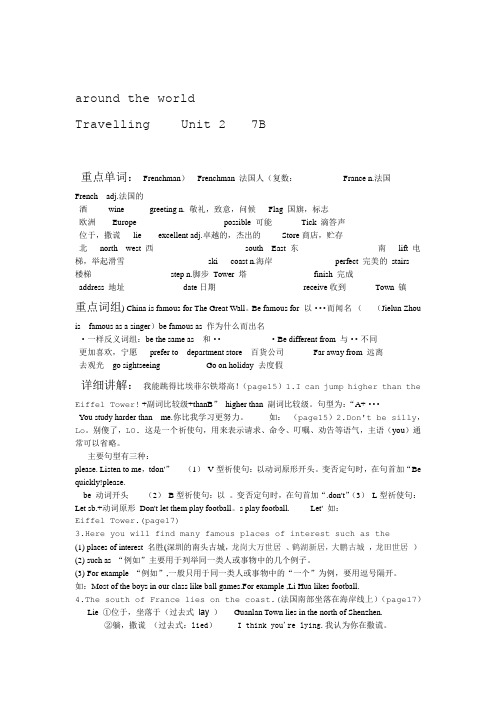
around the worldTravelling Unit 2 7B重点单词:Frenchman)Frenchman 法国人(复数:France n.法国French adj.法国的酒wine greeting n. 敬礼,致意,问候Flag 国旗,标志欧洲Europe possible 可能Tick 滴答声位于,撒谎lie excellent adj.卓越的,杰出的Store商店,贮存北north west 西south East 东南lift 电梯,举起滑雪ski coast n.海岸perfect 完美的stairs楼梯step n.脚步Tower 塔finish 完成address 地址date日期receive收到Town 镇重点词组) China is famous for The Great Wall。
Be famous for 以···而闻名((Jielun Zhouis famous as a singer)be famous as 作为什么而出名·一样反义词组:be the same as 和···Be different from 与··不同更加喜欢,宁愿prefer to department store 百货公司Far away from 远离去观光go sightseeing Go on holiday 去度假详细讲解:我能跳得比埃菲尔铁塔高!(page15)1.I can jump higher than theEiffel Tower! +副词比较级+thanB”higher than 副词比较级。
句型为:“A+···You study harder than me.你比我学习更努力。
如:(page15)2.Don't be silly,Lo。
Bunit广州深圳沪教版牛津英语七年级下册教案
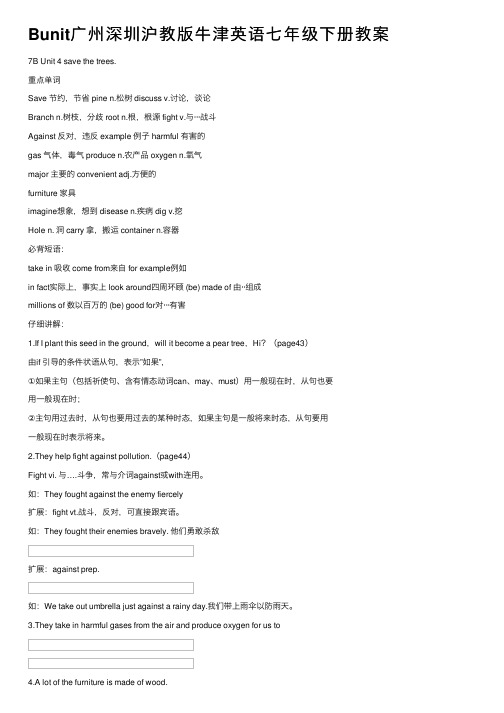
Bunit⼴州深圳沪教版⽜津英语七年级下册教案7B Unit 4 save the trees.重点单词Save 节约,节省 pine n.松树 discuss v.讨论,谈论Branch n.树枝,分歧 root n.根,根源 fight v.与···战⽃Against 反对,违反 example 例⼦ harmful 有害的gas ⽓体,毒⽓ produce n.农产品 oxygen n.氧⽓major 主要的 convenient adj.⽅便的furniture 家具imagine想象,想到 disease n.疾病 dig v.挖Hole n. 洞 carry 拿,搬运 container n.容器必背短语:take in 吸收 come from来⾃ for example例如in fact实际上,事实上 look around四周环顾 (be) made of 由··组成millions of 数以百万的 (be) good for对···有害仔细讲解:1.If I plant this seed in the ground,will it become a pear tree,Hi?(page43)由if 引导的条件状语从句,表⽰”如果”,①如果主句(包括祈使句、含有情态动词can、may、must)⽤⼀般现在时,从句也要⽤⼀般现在时;②主句⽤过去时,从句也要⽤过去的某种时态,如果主句是⼀般将来时态,从句要⽤⼀般现在时表⽰将来。
2.They help fight against pollution.(page44)Fight vi. 与….⽃争,常与介词against或with连⽤。
如:They fought against the enemy fiercely扩展:fight vt.战⽃,反对,可直接跟宾语。
牛津深圳版英语七下Unit 2《Travelling around the world》(writi
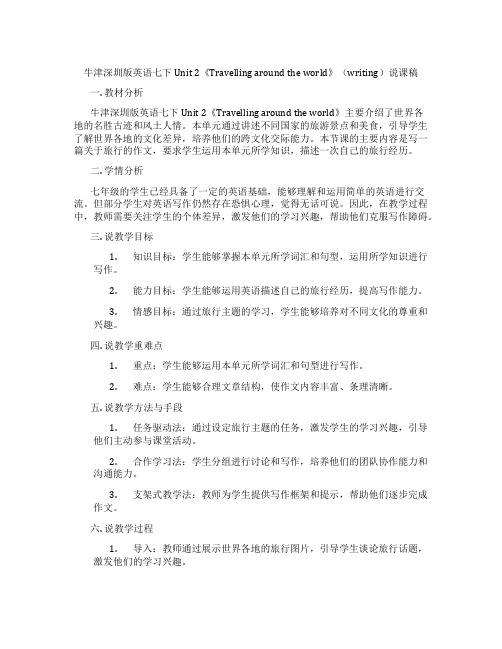
牛津深圳版英语七下Unit 2《Travelling around the world》(writing)说课稿一. 教材分析牛津深圳版英语七下Unit 2《Travelling around the world》主要介绍了世界各地的名胜古迹和风土人情。
本单元通过讲述不同国家的旅游景点和美食,引导学生了解世界各地的文化差异,培养他们的跨文化交际能力。
本节课的主要内容是写一篇关于旅行的作文,要求学生运用本单元所学知识,描述一次自己的旅行经历。
二. 学情分析七年级的学生已经具备了一定的英语基础,能够理解和运用简单的英语进行交流。
但部分学生对英语写作仍然存在恐惧心理,觉得无话可说。
因此,在教学过程中,教师需要关注学生的个体差异,激发他们的学习兴趣,帮助他们克服写作障碍。
三. 说教学目标1.知识目标:学生能够掌握本单元所学词汇和句型,运用所学知识进行写作。
2.能力目标:学生能够运用英语描述自己的旅行经历,提高写作能力。
3.情感目标:通过旅行主题的学习,学生能够培养对不同文化的尊重和兴趣。
四. 说教学重难点1.重点:学生能够运用本单元所学词汇和句型进行写作。
2.难点:学生能够合理文章结构,使作文内容丰富、条理清晰。
五. 说教学方法与手段1.任务驱动法:通过设定旅行主题的任务,激发学生的学习兴趣,引导他们主动参与课堂活动。
2.合作学习法:学生分组进行讨论和写作,培养他们的团队协作能力和沟通能力。
3.支架式教学法:教师为学生提供写作框架和提示,帮助他们逐步完成作文。
六. 说教学过程1.导入:教师通过展示世界各地的旅行图片,引导学生谈论旅行话题,激发他们的学习兴趣。
2.呈现:教师展示一篇关于旅行经历的范文,让学生了解文章结构和常用表达。
3.实践:学生分组讨论,分享自己的旅行经历,互相提供写作素材。
4.指导:教师为学生提供写作框架和提示,引导学生逐步完成作文。
5.展示:学生展示自己的作品,大家共同欣赏和评价。
6.总结:教师对本节课的内容进行总结,强调写作技巧和注意事项。
牛津英语七年级下册 unit2教案

牛津英语七年级下册 unit2教案牛津英语7Bunit2语法\'no\'and\'none\'no1.通常只用作形容词,后面必须跟名词,意思相当于nota或者notany。
2.不能和另一个限定词(冠词、物主代词或者指示词)连用。
否则应该用noneof。
.Ican\'tgetthere----there\'snobus.2.Therewerenolettersforthismorning.3.Noteacherswerethere,either.none.通常用作代词,后面无需加名词,意思相当于no+名词。
2.noneof…的意思是notanyof…。
当其用于句首时,如果none指代的是可数名词,那么后面的谓语动词既可以用单数,也可以用复数。
.Thereisnomilkinthisbottle,andthereisnoneinthat bottle,either.2.Ilikenoneofthefood.3.Noneofmyfriendslivenearhere.实战演练:根据句意,选用no或none填空。
.______studentsareintheclassroomandthereis_____ teacherinit,either.2.----Arethereanybooksonthedesk?----No,thereare________.3.SorryIcan\'tstop----Ihave______time.4.I\'veread_______ofthesebooks.5.______ofthemcameintime.6.Shehad______ideawhatImeant.7.Thesignmeans\'_______smokinghere\'.8.Ilike_______ofthefood.Ittastessour.Thedefinitearticle\'the\'定冠词the主要和名词连用,表示某个或某些特定的人或者东西。
牛津英语七年级下册7BUnit2教案教学设计表格版

7B Unit 2 NeighboursComic strip and Welcome to the unit7B Unit 2 NeighboursReading1shopping1.能了解有关社区中心的知识。
2.能用英语介绍社区中心的活动内容Pictures, recorder, computerStep 1 Warm upStep 1 Revision1、与学生就居住的社区环境进行交流,复习前一课时的内容。
2、Who lives next to /above/below you? Who’s you r neighbour? What does he/she do? Where does he/she work? What do you think of him/her? Do you welcome him/her to your home? Do you always help each other?Step 2 Presentation1、I’m very lucky to have many good neighbours. They have different skills and can do many diff erent things. They’re also very helpful. When they’re free, they often go to the community centre to help other.2、Look, here are some posters. They show some activities in my community centre this Sunday.Step 3 Practise1、指导学生开展活动,巩固前面所学的新知识。
教师将写有“there is so mething wrong with ”或“I cannot”的纸条分别发给两组学生,让他们各自填写遇到的问题,教师再将写有“I can help with ”,“I am a(an)”或“I am good at ”的纸条分别发给另外两组学生,让他们填写自己能提供的帮助。
7B Unit1-unit2 最新广州、深圳沪教版牛津英语七年级下册教案
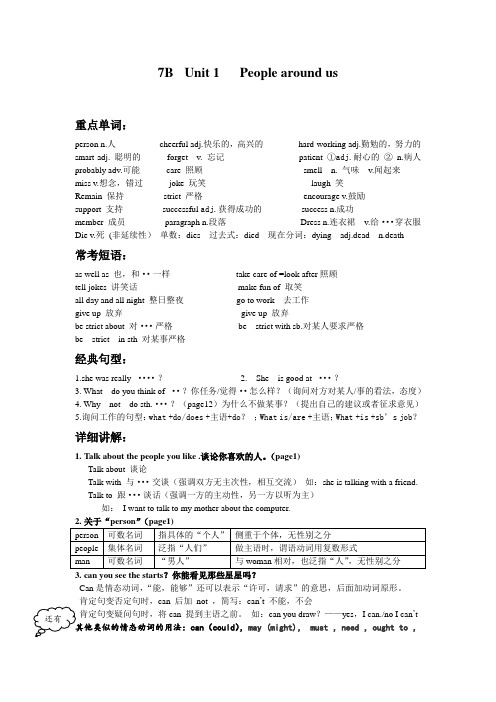
7B Unit 1 People around us重点单词:person n.人cheerful adj.快乐的,高兴的hard-working adj.勤勉的,努力的smart adj. 聪明的forget v. 忘记patient ①adj.耐心的②n.病人probably adv.可能care 照顾smell n. 气味v.闻起来miss v.想念,错过joke 玩笑laugh 笑Remain 保持strict 严格encourage v.鼓励support 支持successful adj.获得成功的success n.成功member 成员paragraph n.段落Dress n.连衣裙v.给···穿衣服Die v.死(非延续性)单数:dies 过去式:died 现在分词:dying adj.dead n.death常考短语:as well as 也,和··一样take care of =look after照顾tell jokes 讲笑话make fun of 取笑all day and all night 整日整夜go to work 去工作give up 放弃give up 放弃be strict about 对···严格be strict with sb.对某人要求严格be strict in sth 对某事严格经典句型:1.she was really ····?2. She is good at ···?3. What do you think of ··?你任务/觉得··怎么样?(询问对方对某人/事的看法,态度)4. Why not do sth.···?(page12)为什么不做某事?(提出自己的建议或者征求意见)5.询问工作的句型:what +do/does +主语+do?;What is/are +主语;What +is +sb’s job?详细讲解:1.Talk about the people you like .谈论你喜欢的人。
【教育学习文章】牛津英语七年级下册 unit2教案

牛津英语七年级下册 unit2教案牛津英语7Bunit2语法\'no\'and\'none\'no1.通常只用作形容词,后面必须跟名词,意思相当于nota或者notany。
2.不能和另一个限定词(冠词、物主代词或者指示词)连用。
否则应该用noneof。
.Ican\'tgetthere----there\'snobus.2.Therewerenolettersforthismorning.3.Noteacherswerethere,either.none.通常用作代词,后面无需加名词,意思相当于no+名词。
2.noneof…的意思是notanyof…。
当其用于句首时,如果none指代的是可数名词,那么后面的谓语动词既可以用单数,也可以用复数。
.Thereisnomilkinthisbottle,andthereisnoneinthat bottle,either.2.Ilikenoneofthefood.3.Noneofmyfriendslivenearhere.实战演练:根据句意,选用no或none填空。
.______studentsareintheclassroomandthereis_____ teacherinit,either.2.----Arethereanybooksonthedesk?----No,thereare________.3.SorryIcan\'tstop----Ihave______time.4.I\'veread_______ofthesebooks.5.______ofthemcameintime.6.Shehad______ideawhatImeant.7.Thesignmeans\'_______smokinghere\'.8.Ilike_______ofthefood.Ittastessour.Thedefinitearticle\'the\'定冠词the主要和名词连用,表示某个或某些特定的人或者东西。
(完整word版)7Bunit2最新广州、深圳沪教版牛津英语七年级下册教案.doc

7B Unit 2Travelling around the world重点单词:France n.法国French adj.法国的Frenchman 法国人(复数:Frenchman)Flag 国旗,标志Tick滴答声Store 商店,贮存East 东coast n.海岸Tower 塔Town 镇greeting n. 敬礼,致意,问候possible 可能excellent adj. 卓越的,杰出的south南perfect 完美的finish完成receive 收到wine 酒Europe 欧洲lie 位于,撒谎west 西north 北ski 滑雪lift电梯,举起step n.脚步stairs楼梯date 日期address 地址重点词组Be famous for以···而闻名be famous as 作为什么而出名Be different from与···不同Far away from 远离Go on holiday去度假(China is famous for The Great Wall 。
)( Jielun Zhou is famous as a singer)反义词组: be the same asdepartment store百货公司prefer togo sightseeing去观光和···一样更加喜欢,宁愿详细讲解:1.I can jump higher than the Eiffel Tower!我能跳得比埃菲尔铁塔高!(page15)higher than 副词比较级。
句型为:“A+ ··· +副词比较级 +thanB ”如: You study harder than me.你比我学习更努力。
2.Don ’tbe silly , Lo 。
别傻了, LO. ( page15)这是一个祈使句,用来表示请求、命令、叮嘱、劝告等语气,主语(you)通常可以省略。
深圳牛津版英语学案七年级下册Unit2
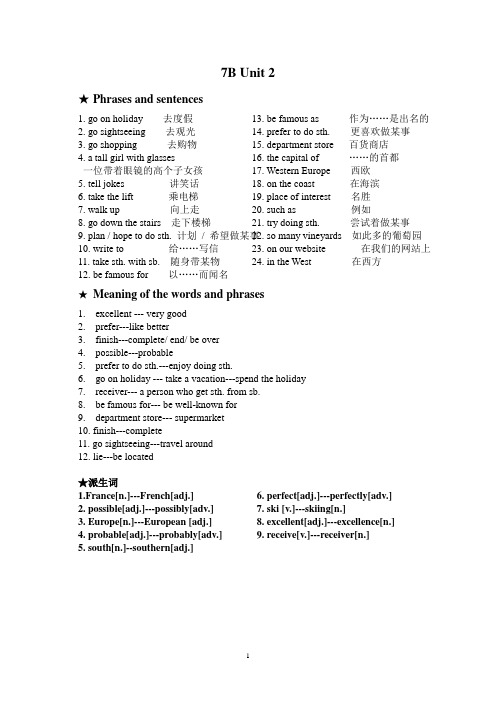
1 7B Unit 2★ Phrases and sentences1. go on holiday 去度假2. go sightseeing 去观光3. go shopping 去购物4. a tall girl with glasses 一位带着眼镜的高个子女孩5. tell jokes 讲笑话6. take the lift 乘电梯7. walk up 向上走8. go down the stairs 走下楼梯9. plan / hope to do sth. 计划 / 希望做某事 10. write to 给……写信 11. take sth. with sb. 随身带某物 12. be famous for 以……而闻名13. be famous as 作为……是出名的14. prefer to do sth. 更喜欢做某事15. department store 百货商店16. the capital of ……的首都 17. Western Europe 西欧18. on the coast 在海滨19. place of interest 名胜20. such as 例如21. try doing sth. 尝试着做某事22. so many vineyards 如此多的葡萄园23. on our website 在我们的网站上24. in the West 在西方★ Meaning of the words and phrases1. excellent --- very good2. prefer---like better3. finish---complete/ end/ be over4. possible---probable5. prefer to do sth.---enjoy doing sth.6. go on holiday --- take a vacation---spend the holiday7. receiver--- a person who get sth. from sb.8. be famous for--- be well-known for9. department store--- supermarket10. finish---complete11. go sightseeing---travel around12. lie---be located★派生词1.France[n.]---French[adj.]2. possible[adj.]---possibly[adv.]3. Europe[n.]---European [adj.]4. probable[adj.]---probably[adv.]5. south[n.]--southern[adj.]6. perfect[adj.]---perfectly[adv.]7. ski [v.]---skiing[n.]8. excellent[adj.]---excellence[n.]9. receive[v.]---receiver[n.]。
牛津沪教版英语七年级下Unit2 新课教案

15. get to…from…从…到…
16. the way to the cinema到电影院的路
17. turn left/ right…into_______(street/road)向左/右拐进…路/街道
【语言点精讲】
1.I like funny films very much.
牛津沪教版英语七年级下unit2新课教案16七年级下unit一新课讲解词汇拓展do同义词组wouldlikedo想要做某事filmguide阅读电影指南discusswhichfilmsee讨论看哪部电影看一看havefumyfilms滑稽电影actionfilm动作片filmsaboutadventuresclownspolicemenrobbers冒险片小丑片警匪片robber抢劫犯要注意robrobberylovestoryabout?一个关于?的爱情故事fullfun充满笑声和趣事laughv
( ) 8. We’ve got to decide which film _________.
A. has seen B. to see C. seeing D. see
( ) 9. There are quite _________ interesting films on these days.
full of laughter and fun充满笑声和趣事
laugh笑(v.)laughter笑声(n.)
be full of充满full是个形容词,表示满的,饱的
be full of与be filled with是近义词,同时要注意
fill……with……的用法(用。。。装满。。。)
e.g. The room is full of people.这间屋里挤满了人----The room is filled with people.
Bunit广州深圳沪教版牛津英语七年级下册教学说课
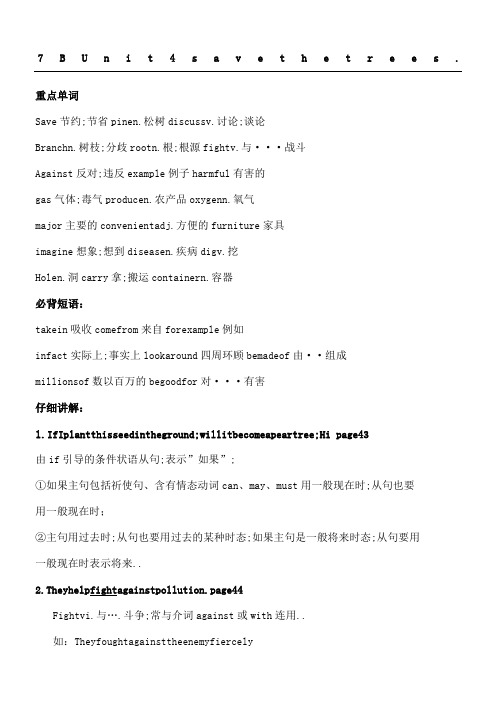
7B U n i t4s a v e t h e t r e e s.重点单词Save节约;节省pinen.松树discussv.讨论;谈论Branchn.树枝;分歧rootn.根;根源fightv.与···战斗Against反对;违反example例子harmful有害的gas气体;毒气producen.农产品oxygenn.氧气major主要的convenientadj.方便的furniture家具imagine想象;想到diseasen.疾病digv.挖Holen.洞carry拿;搬运containern.容器必背短语:takein吸收comefrom来自forexample例如infact实际上;事实上lookaround四周环顾bemadeof由··组成millionsof数以百万的begoodfor对···有害仔细讲解:1.IfIplantthisseedintheground;willitbecomeapeartree;Hi page43由if引导的条件状语从句;表示”如果”;①如果主句包括祈使句、含有情态动词can、may、must用一般现在时;从句也要用一般现在时;②主句用过去时;从句也要用过去的某种时态;如果主句是一般将来时态;从句要用一般现在时表示将来..2.Theyhelpfightagainstpollution.page44Fightvi.与….斗争;常与介词against或with连用..如:Theyfoughtagainsttheenemyfiercely扩展:fightvt.战斗;反对;可直接跟宾语..如:Theyfoughttheirenemiesbravely.他们勇敢杀敌扩展:againstprep.意为“;违背;违抗;紧靠;防备”如:Wetakeoutumbrellajustagainstarainyday.我们带上雨伞以防雨天..3.Theytakeinharmfulgasesfromtheairandproduceoxygenforustobreathe.page45①harmfuladj.有害的;harmn.vt.损害;伤害;危害;harmlessadj.无害的;不致伤的.producevt.产生;生产..也可以作为不可数名词;意为:产品;农产品..4.Alotofthefurnitureismadeofwood.page45①Furniture 不可数名词;家具..asetoffurniture 一套家具;一件家具 ..MypianoismadeinBeijing.Thebirthdaycakeismadebymymother.Thetableismadeofwood.Wineismadefromgrapes.Grapesaremadeintowine.ThebikeismadeinChina.记忆顺口溜:物质不变用of;物质变化是from5.Ican’timagineaworldwithouttrees.page45Imagine vt.想像;猜想;臆断.后面可跟名词;代词;动名词和从句作宾语..6.However;…page48However副词;表转折;意为:然而;不过..Hate讨厌;不喜欢7.Shecanskateataveryhighspeedbecauseshepractisesalot.①Practisevt.训练;练习..宾语可接名词;代词;动名词..如:It's very important to practise listening. 练习听力是非常重要的..②Practisevi.如:Don' t forget to practise after class. 课后别忘了练习..③practise的名词是 practice不可数名词..通常指经常性或系统性的重复练习..Practice makes perfect. 是一句谚语;意思是“熟能生巧”..8.Butthespeakerdidnotstopspeakinguntiltwentypasttwelve.page52Not…..until意为:直到…..才…....主语的动词一般为非延续性动词;它所表示的动作直到until所表示的时间才发生..如:Wewon’tseeanyflowersuntilMay.Unitil连词;意为:直到…..时..用于肯定句;主句的动词一般为延续性动词..如:Hewaitsthechildrenareasleep.Ishallstayhereuntiltwelveo’clock.9.10.辨析Carry;take;bring11.ItcoversfiveandahalfmillionsquarekilometersoftheAmazonBasinandspreadsacros sninecountries.page541①Coverv.覆盖;遮盖;cove…with用···把··盖上;becoveredwith…被….覆盖着..如:Theroadisusuallycoveredwithsnowinwinter②Cover可数名词;意为:覆盖物;盖子;封面如:Thenewbookneedsanewcover.(2)区别:across;cross;through;over12.Manylivingthingslosetheirhomesbecauseofdeforestation.page54许多生物因为森林砍伐失去家园..13.Asaresult;thenumberofkindsofanimals;birds;insectsandtreesintheworldisdecre asing.结果;世界上动物、鸟类、昆虫和树的种类的数目正在减少..page5414.Teaisthemostpopulardrinkintheworldbesideswater.page55茶是世界上除了水之外最受欢迎的饮料..语法:现在进行时一、教材经典句子:1.Thechildrenareplayinginthepark..2.WearestayingatPeter’shouseatthemoment..二、现在进行时:一般表示此刻正在进行的动作;也表示目前阶段一直进行的动作..三、用法:1.现在进行时一般表示此刻正在进行的动作;常和now;rightnow;atthismoment等时间状语连用;以及动词look;listen等..如:LookSheiscleaningmyroomnow..2现在进行时表示目前阶段一直进行的动作;但是说话时不一定正在发生;常和“thesedays;thisweek;atpresent”等连用..如:IsJameworkinghardthisterm注意:1.一些表示状态和意愿的动词;如be;like;want;kown;think;have等;不能用于现在进行时态..如:Iwanttogohomenow..2e;go;leave;stay;start;arrive等表示往返或位置转移的动词;可以用现在进行时表示将要发生的动作;这些动词可以与“tomorrow;nextweek”等表示将来的时间状语连用..3.现在进行时与always;often等词连用;也可表示习惯的、经常重复的动作..意为总是;老师..此时常常有埋怨、赞赏的色彩..如:Maryisalwaystalkingaboutherson.四、结构:1.肯定句:主语+beam;is;are+现在分词+其他如:Heisdoinghishomework.2.否定句:主语+beam;is;are+not+现在分词+其他如:heisn’twritingnow3.一般疑问句:beam;is;are+主语+现在分词+其他如:Areyousinging ——yes;Iam.4.特殊疑问句:疑问词+beam;is;are+主语+现在分词+其他-Whatareyoudoing -Iamdoingmyhomework.五、现在分词的构成:六、1一般情况下;直接加ing;如:cook-cooking七、2以不发音的e结尾;去e加ing;如:make-making;taste-tasting八、3如果末尾是一个元音字母和一个辅音字母;双写末尾的辅音字母;再加ing;如:run-running;stop-stoppingsit-sittingget-gettingrun-runningforget-forgettingbegin-beginning4以ie结尾的动词;改ie为y加ing;die--dying lie--lying。
- 1、下载文档前请自行甄别文档内容的完整性,平台不提供额外的编辑、内容补充、找答案等附加服务。
- 2、"仅部分预览"的文档,不可在线预览部分如存在完整性等问题,可反馈申请退款(可完整预览的文档不适用该条件!)。
- 3、如文档侵犯您的权益,请联系客服反馈,我们会尽快为您处理(人工客服工作时间:9:00-18:30)。
7B Unit 2 Travelling around the world重点单词:France n.法国French adj.法国的Frenchman 法国人(复数:Frenchman)Flag 国旗,标志greeting n. 敬礼,致意,问候wine 酒Tick 滴答声possible 可能Europe欧洲Store商店,贮存excellent adj.卓越的,杰出的lie 位于,撒谎East 东south 南west 西north 北coast n.海岸perfect 完美的ski 滑雪lift 电梯,举起Tower 塔finish 完成step n.脚步stairs 楼梯Town 镇receive收到date日期address 地址重点词组Be famous for 以···而闻名(China is famous for The Great Wall。
)be famous as 作为什么而出名(Jielun Zhou is famous as a singer)Be different from 与···不同反义词组:be the same as 和···一样Far away from 远离department store 百货公司prefer to 更加喜欢,宁愿Go on holiday 去度假go sightseeing 去观光详细讲解:1.I can jump higher than the Eiffel Tower!我能跳得比埃菲尔铁塔高!(page15)higher than 副词比较级。
句型为:“A+···+副词比较级+thanB”如:You study harder than me.你比我学习更努力。
2.Don’t be silly,Lo。
别傻了,LO.(page15)这是一个祈使句,用来表示请求、命令、叮嘱、劝告等语气,主语(you)通常可以省略。
主要句型有三种:(1)V型祈使句:以动词原形开头。
变否定句时,在句首加“don’t”Listen to me,please.(2)B型祈使句:以be 动词开头Be quickly!please.(3)L型祈使句:Let sb.+动词原形.变否定句时,在句首加“don’t”。
Let’s play football. 如:Don’t let them play football。
3.Here you will find many famous places of interest such as the Eiffel Tower.(page17)(1)places of interest 名胜(深圳的南头古城,龙岗大万世居、鹤湖新居,大鹏古城,龙田世居)(2)such as “例如”主要用于列举同一类人或事物中的几个例子。
(3)For example “例如”,一般只用于同一类人或事物中的“一个”为例,要用逗号隔开。
如:Most of the boys in our class like ball games.For example ,Li Hua likes football.4.The south of France lies on the coast.(法国南部坐落在海岸线上)(page17)Lie ①位于,坐落于(过去式lay )Guanlan Town lies in the north of Shenzhen.②躺,撒谎(过去式:lied) I think you’re lying.我认为你在撒谎。
过去分词 lain 现在分词 lying5.by的用法:(page17)(1)在···的旁边by the window (2)乘车,乘船by bus(3)在···之前,不迟于by ten o’clock at night。
(4)表示方法,手段。
He is drawing by pencil。
6.prefer:(跟在prefer 后面的是他更喜欢的)(1)prefer sth. 更喜欢某事(2)prefer sth to sth. 比起某物更喜欢某物he prefers apple to banana。
(3)Prefer doing sth to doing sth.宁愿做某事也不愿做某事。
I Prefer playing the piano to playing football。
我还知道:Would rather+动词原形···than+动词原形···宁愿···也不愿She Would rather play the piano than play football。
(4)prefer to do sth.更喜欢做某事。
I prefer to read English in the morning。
7.try doing sth 试着做某事You should try eating more fruit。
Try to do sth 努力去做某事Try to get up early。
10.I learn a lot about the Ming and Qing dynasties.我学到许多关于明朝和清朝的知识。
(page22)11.Date日期(page22)询问日期时:what’s the date?或者what date it is? 回答:It’s July ···我们来拓展一下:询问星期几:what day it is?回答:It’s Monday。
13.Backpackers usually do not spend too much money on a trip。
Grammar 连词Conjunctions连词:是一种虚词,它不能独立担任句子成分而只起连接词与词、短语与短语或句子与句子作用。
连词主要分为两类:并列连词和从属连词。
分为:表平行或对等关系的连词、表转折关系的连词、表选择关系的连词、表因关系的连词一、并列连词:1.平行或对等关系的并列连词and “和” ;both…and…“……和……两个都” ;as well as“也”not only…but also…“不但……而且……”; neither…nor…“既不……也不……”如:①My mother bought me a present,and I like it very much.我妈妈买了一件礼物给我,我很喜欢②He can speak not only English but also French.他会说英语还会说法语。
2.表转折关系的并列连词:but“但是”;yet“然而”;while“而”;however“然而”如: Lucy likes red while Lily likes white。
露西喜欢红的,然而莉莉喜欢白的。
3.表选择关系的并列连词:or“或者”;either…or…“要么……要么……”注:由or 连接的句子可以转换为有否定条件构成的主从复合句。
Eg:① Study hard,or you’ll fail the exam.努力学习,否则你考试会失败的。
=If you don’t study hard,you’ll fail the exam.②Either you or he goes. “要么你去,要么他去”。
4.表因果关系的并列连词so “所以,因此”; for “因为”Eg:①Kate was ill so she didn’t go to school.凯特病了所以没去学校。
②I have to stay up,for I have lots of homework to do。
我必须熬夜,因为我有很多作业。
二、不能同时出现在一个句子中的连词。
1.because(因为),so(所以)不能同时出现在一个句子里,只能用其一.eg:Because he was tired,he couldn’t walk here.因为他很累,所以走不到这里。
=He was tired,so he couldn’t walk there.2.although/though(虽然),but(但是)不能同时出现在一个句子里,只能用其一。
但although/though和yet 可以同时出现在一个句子里(yet 用作副词)Eg:Though he was tired,he still worked hard.虽然他很累,但是她仍然坚持工作=He was tired,but he still worked hard.:三、and 和or 用于否定句中的区别1)当列举成分是主语,又在否定词之前时用and连接;而当列举成分在否定词之后时,用“or”构成完全否定.Eg:I can’t sing or dance. 我不会唱歌,也不会跳舞。
Lucy and lily can’t speak Chinese. 露西和莉莉都不会说汉语。
注意:在否定句中,如果所连接的两部分都有否定词那么用“and”而不用“or”Eg:There is no water and no air on the moon.月球上没有水也没有空气。
2) 在否定句中,without +and;而在肯定句中,without+or,构成完全否定。
Eg:Man can’t live without air and water=Man will die without air or water.四、由either……or….., neither……nor……,not only……but also……连接两个并列主语时,谓语动词与较近的主语保持一致。
(就近原则)Not only my parents but also I am looking forward to meeting you.不止我父母,连我很也很想见到你。
